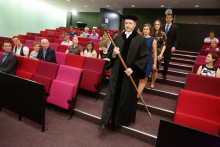Until recently, the ius promovendi was reserved for full professors. 'The Dutch universities wanted to expand this and the option was legally established in September 2017,' says Paul van Dijk, director of the Twente Graduate School. 'The expansion has everything to do with aligning the standards with foreign countries, where it is very normal for associate professors to have the right to supervise PhD candidates.’
Only group ‘UHD1’
The universities are allowed to choose their own interpretation of the ius promovendi. For the time being, the UT opts to grant it only to researchers with the UHD1 profile and wants to look at whether the right can also be awarded to the ones with the UHD2 job profile. The eligible scientists must meet a number of criteria. This includes, for example, having their own line of research, experience with co-supervising at least three PhD candidates and at least two approved research proposals with a total size of at least 250.000.
The Doctorate Board, including the deans and the rector, ultimately determines who will receive the ius promovendi. ‘The deans are ready,’ says Van Dijk. 'They will each draw up a list for their faculty. Then the board discusses these lists and a definitive list is drawn up. That must be ready by the 1st of April.’
The UT is pleased with the expansion, according to Paul van Dijk. ‘This way we can create a level playing field with foreign countries. And we have more to offer young researchers, because we can give them a privilege that is currently reserved for professors much sooner.’







